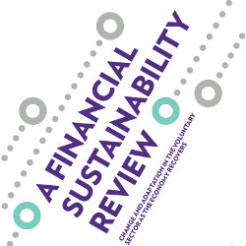Cuts in government funding will leave the charity sector facing a £4.6bn hole in its finances by 2018/19, according to a report published today by NCVO.
NCVO's report, A financial sustainability review: Change and adaption in the voluntary sector as the economy falters, says that the sector will struggle to maintain the spending levels seen in 2012/13 while it faces government cuts to contracts and grants, "tepid" growth in donations from the public and the impact of inflation.
The report is based on a review of the sector’s finances which was led by NCVO.
The review used data from the UK Civil Society Almanac, alongside qualitative and quantitative data from the Charity Finance Group, Small Charities Coalition, Institute of Fundraising, Navca and Locality.
It also put out a call for evidence which produced 106 responses. A working group made up of representatives from sector bodies met five times between July 2014 and March 2015.
Sector income from individuals has grown by £2.3bn in the last five years and in 2013/14 represents 48 per cent of total income. In 2007/08 income from individuals represented 40 per cent of total income.
The report warns that for income from individuals to offset the expected cuts from government over the coming Parliament it would have to grow at 3.75 per cent per year, “well above recent trends”.
Most of the growth in income from individuals comes from charging fees for services. And according to the report this “creates a serious challenge for some voluntary sector organisations as they balance the need to generate new sources of income against the requirement that they continue pursuing their charitable objectives and delivering public benefit“.
Sir Stuart Etherington, chief executive of NCVO, said: “This report is a sharp reminder of the scale of the challenge facing charities at the moment. While the headline figures show the charity sector as a whole keeping its head above water, they mask the crushing blows that many small and medium-sized charities have sustained in recent years.
“There is an urgent need for the government to solve the problems of public service commissioning. Too many contracts exclude smaller organisations, being designed in such a way as to privilege national and international commercial outsourcing providers.
Caron Bradshaw, chief executive at CFG, described the review as a “reality check” and said: “We need more investment in charities' capacity, particularly financial capacity, so that they are able to adapt under growing financial pressure and chart a course towards sustainability.”
Smaller charities suffering the most
The review found that smaller charities were being hardest hit by spending cuts.
The report warns that government move to contracts rather than grants is “especially challenging” from small and medium charities.
It said: “The particular advantages of grant funding are at risk of being overlooked. If these concerns are not addressed, there is a risk that small-and medium-sized charities are unable to form part of a diverse market of public service providers in the future.”
Almanac data shows that charities with an income of under £1m have seen their income from government fall by around 34 to 38 per cent. Community organisations are earning less from government contracts than at any point since 2008.
Tony Armstrong, chief executive of Locality, said: “This is due not only to a reduction in overall funding for services but more worryingly reflects an increasing trend of large national organisations snatching local contracts from community organisations because they package services in a way that looks cheaper and more attractive to commissioners.
“These cut-price contracts might look like a great deal on paper, but they continually fail to deliver what's needed and costs end up spiralling, with community organisations having to step in to provide desperately needed services, while also footing the bill.”
Foundations need to reconsider their role
The report suggest that grantmaking foundations have become a more important part of the funding landscape, partly because they are one of the dwindling amount of unrestricted funding from statutory sources.
“Charitable foundations now account for an increasingly important part of the sector’s income given the reduction in grant funding from government,” the report said. But they may need to “reconsider their role” because: “More co-ordinated or different approaches to funding the sector may be necessary to compensate for the loss of government income, for example for capacity building.”
According to the report asset prices are beginning to recover to pre-recession level, which if they continue to rise will “support charitable foundations in increasing vital grant funding” but that they would need to more than double the amount of that they give away to make up for the loss of government income.









